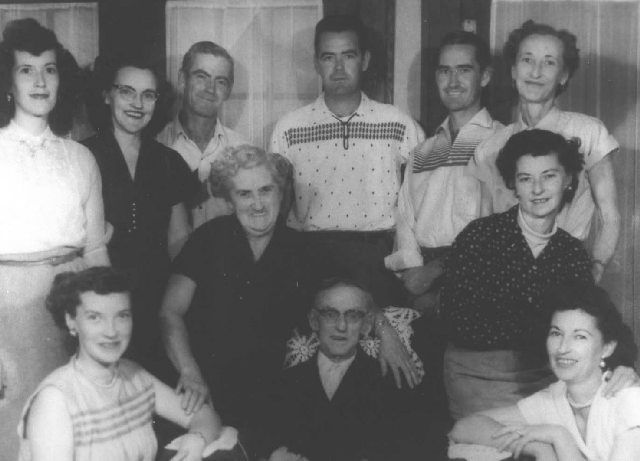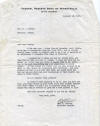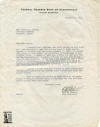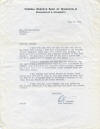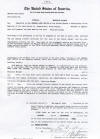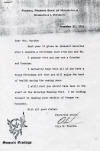|
In
1904 my husband William J. Murphy, came from Nebraska to
Lyman County and filed on a homestead in
Edna Township. For a while, he worked for
Bill Place who owned a sheep ranch across the
road from his
homestead. At that time the railroad only
came as far west as
Chamberlain, so their provisions had to be
hauled from there with a team and wagon. Then
about 1906, the railroad was built
through Kennebec as far west as Murdo, so they
could get their lumber, fencing and
other supplies from there.
At one time, Kennebec
was called
Hotch City, and the post office was at
the Houchin place on
Medicine Creek. Then they started to improve
their homesteads.
I, Beatrice Duffy, came to Lyman County in 1907,
and married William Murphy in 1908, in Presho, South Dakota.
We were the first couple to be married in
the newly built Catholic church, which
later burned down.
Our neighbors at that
time were my aunt, Anna McMullen, who came to
Lyman County in a
covered wagon in 1906. Her brother Edward came later. Other
neighbors were
William and Myrtle Opperman, Herbert and
Grace Ashcraft, John and
Edith Walker,
Charles and Ethel Fredrick, Newie Norton
and his father William
Norton, Mr. and Mrs. Knute Swensen and their
family, Charles Lyon, his father and
sister Lulu, Mike Jasper, Claude and Elizabeth
Paine, Fred Anderson, Mr. and Mrs. Levi Dungan
and family, John and Pat Kerwin and their
sisters, Ann and Bee and Mr.and Mrs. William
Miner. Mr. and Mrs. Miner ran a little store
and the Edna Post Office.
Mrs. Miner was also a
midwife for the Indians across the White River on the Rosebud
Reservation. Of course later on, others moved in
but these were the first settlers.
In 1906, William F. Murphy came to live
with his son, William J.
and in 1908, Joseph Duffy and Mrs. Rose Kineen
and three sons
came to Edna Township. We had a little old
log school house in which
my cousin, Molly McMullen (now Mrs.
Robert McNameee, of Portland, Oregon)
taught. After that Clara Brewer taught. Then about
1912, they built the Edna School House and
that is still
standing. The desks are now in the Historical
Museum in Presho. You
will find my son Joseph's initials carved
on two of them. When I think of that little old
school house and the teachers that taught in
it, and compare them with what the teachers
have today, it doesn't seem possible.
Among the teachers we had
were Agatha Moynahan,
Maggie McAreavey, Miss Nims and Miss
Sears. They taught 20 to 25 children from the first
to the eighth grade and were their own
janitors, carried in their own kindling and coal,
started the fires, carried in their drinking
water and cleaned their schools for the
large sum of 30 to 50 dollars a month, and
they really taught the things that counted.
I still have several Spelling Certificates
that my children received. Six of our
nine children went to that school.
Doctors, too, had a hard
time in those
days, no roads, just trails. Doctor McClellan
came to our house from
Kennebec, 15
miles, through snow, ice and bad roads with a
team and buggy. He
delivered all nine of our children and charged the
large sum of from 25 to 40 dollars. Try to
get a doctor to
come today at any price.
When the Miners gave up
the post office at Edna in 1911, Charles
Fredrick took it and William
Norton ran it for him until it was discontinued.
Mike O'Malley
and his sister Maggie had the
Houston Post Office down on the White River.
We had a Star Route at that time and when the
O'Malleys decided they didn't want the office
any longer they were going to
discontinue our route (the Edna Post Office had
already been discontinued) so I agreed to take
the Houston office and I had it for about a year.
When they made a Rural Route out of it
we no longer needed a post office. John
Davis was our first mail carrier, then Bill
Moynahan carried it for several years with a team and
buggy. No one envied them their job, many
times they had frozen hands and feet.
They had to get out
and shovel snow in the bitter cold wind and
got very little pay. Of course a
postage stamp was only two cents then and a
postal card a penny. Poor Bill is dead now and
buried out in Idaho.
In those days people
were like one big family—what happened to
one happened to all. One morning a
terrible tragedy happened in our neighborhood. John
Walker and two of his little children were
burned
|
|
to death when their home
was destroyed by fire, leaving his wife and four children
homeless. It was as if it had happened to us all. A
few years
after, one of
their boys was struck by lightning and
left a wife and three
children. Many sorrows and many happy memories
too.
In those days we had no radios, T.V. or
even telephones, so we
had to make our own amusements, which we did.
In the summer the
neighbors would drop in on Sunday and the men would play
horseshoes and women would visit. It was
nothing to have a dozen or more unexpected guests
for dinner or supper. In the winter they would
play cards or sing and play the piano,
violin and guitar, or maybe they would have a
dance. Where they went they took their
children with them, there was no such thing
as a baby sitter. We had a literary society and
during the winter we had a debate twice a
month in the Edna school
house. We chose our teams and we had some lively
debates on politics, or any other subjects they
happed to think of. It was entertaining and
enlightening too.
During the threshing or haying season the
men exchanged work and so
did the women. It
wasn't easy then, they had old horse power
threshing machines and they were hard on the
men and the horses too.
And the women
didn't have it very easy either. They baked
their own bread, pies and
cakes, churned their own butter, cured or
canned their own meat and raised and dressed
their own chickens and raised their vegetables.
They had no bakeries to go to, no frozen food
to purchase. We had no electric refrigerators,
but we did have our own ice which the men cut
and hauled up from
the White River in the winter and packed in our ice
houses. And we made home made ice cream and
it was surely good. We had no water in the
houses—we had to carry it from cisterns or
wells. In early days we hauled it up in
barrels from the dam, in the summer it was hot
and in the winter it froze. We had no
electric or gas stoves, just the old cook stove, which
we fed with wood, coal or cobs, that we had
to carry in and then carry out the ashes. We
had no hot water, only what we heated in
the tea kettle or in the reservoir on the
stove. No electric washers or dryers - just the old
wash board and tub and the clothes line. In
those days you had to make the best of
everything.
One Christmas
we couldn't get a
Christmas tree so we brought in a big Russian
thistle and the children had a wonderful
time decorating it. They strung pop-corn and
cranberries and we put tinsel and
decorations on it and it was the nicest tree we ever had.
You can do a lot of things if you have to.
Ethel Fredrick and I
used to take long
horse back rides. We would ford the White river (there was no
bridge) and we
would ride over the green prairie in Tripp
County. Ethel was a
great horse woman. Often a bunch of us
would cross the White river to the Rosebud
Reservation on
Saturday night to watch the Indians dance.
They were the Sioux
Indians. Sometimes we crossed on the ice and
it was mighty cold.
Those were the "good old
days". But
people were happy and healthy. They were
not running to the doctor
every day, nor were they demonstrating. We had
a lot of good
years and a lot of bad ones. Years when we
barely got our seed back,
when the hail ruined our crops, when the cattle
died with anthrax and the hogs with
cholera. And then the grasshoppers came and the
dust storms and one by one we lost our
homes and moved to other places to start
again. We moved to Oregon.
I wouldn't want to go
through it
again, but I'm not sorry for having spent those
25 years there. You
had to be tough to take it and I guess we
were. We were very seldom sick and we had
wonderful neighbors. No one ever thought of
locking their doors. We didn't even have a key
for ours. If you were not at home and
someone came along, especially in a storm,
they were welcome to go in and get warm and fix
something to eat and stay all night if
necessary. That is how it was when we first came
there. Of course later on when more people came
it changed some.
We had lots of things
to fight.
Rattlesnakes (I killed a lot of them),
blizzards, drought, dust
storms, grasshoppers, crickets, and wind, but
we lived through it and it gave us a greater
appreciation of what we have today. Of all the
people who were in Edna Township when I
came there, I am the only one living today.
|
